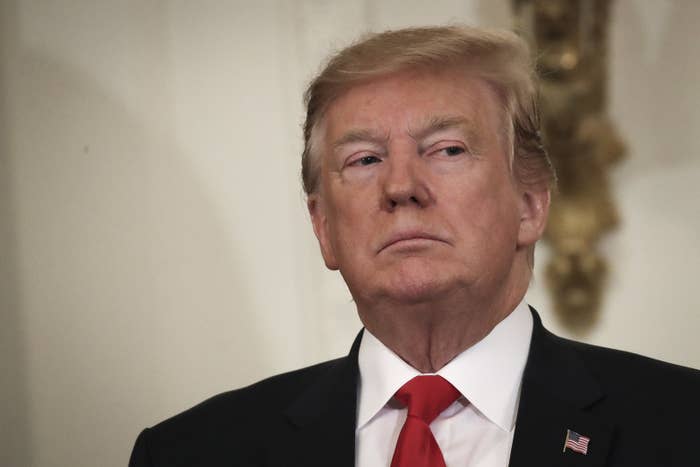
WASHINGTON — President Donald Trump filed a lawsuit Monday against House Democrats seeking to block a subpoena to his longtime accountant, marking the president's first foray into court to stop Democrats from investigating his finances.
Democrats pledged to launch investigations into Trump if they took control of the House of Representatives last November. Now that they have the majority — and the subpoena power that comes with it — Trump's lawsuit is likely just the beginning of a long legal and political fight over how far they can probe into his personal business dealings, as well as the inner workings of his administration.
Trump brought the lawsuit as a private citizen, not as president, which means he's hired outside lawyers to fight the subpoena; the Justice Department isn't involved, and he isn't raising any executive privilege issues. He's arguing that the House Oversight Committee, which issued the subpoena to accounting firm Mazars USA LLP, had "ignored the constitutional limits on Congress' power to investigate."
"With this subpoena, the Oversight Committee is instead assuming the powers of the Department of Justice, investigating (dubious and partisan) allegations of illegal conduct by private individuals outside of government," Trump's lawyers wrote. "Its goal is to expose Plaintiffs’ private financial information for the sake of exposure, with the hope that it will turn up something that Democrats can use as a political tool against the President now and in the 2020 election."
Democrats contend the subpoena is needed to follow up on testimony from Trump's former longtime personal attorney Michael Cohen that Trump falsely represented his financial situation and the value of his assets to lenders.
House Oversight Committee Chair Elijah Cummings released a statement saying "there is simply no valid legal basis to interfere with this duly authorized subpoena from Congress."
"This complaint reads more like political talking points than a reasoned legal brief, and it contains a litany of inaccurate information. The White House is engaged in unprecedented stonewalling on all fronts, and they have refused to produce a single document or witness to the Oversight Committee during this entire year," Cummings said.
Cummings issued a memo April 12 alerting the committee that he planned to subpoena Mazars. The committee had asked the accounting firm to voluntarily produce financial records for Trump and the Trump Organization in late March, but Mazars replied that it couldn't turn over information without a subpoena. It was not a bipartisan move — the committee's top Republican, Rep. Jim Jordan, slammed the decision as a "gross abuse" of the the subpoena power.
The subpoena seeks numerous financial records related to Trump and his companies between 2011 and 2018, as well as any communications related to concerns by Trump's accounts that any documents or information "were incomplete inaccurate, or otherwise unsatisfactory."
Trump's lawyers had warned Mazars not to comply with the subpoena, threatening legal action if it did, according to Politico.
In the lawsuit, Trump's lawyers argued that the subpoenas were solely an exercise in political gamesmanship, and didn't serve any "legitimate legislative purpose." They also stressed that Cohen, the purported reason why Democrats issued the subpoena in the first place, is a "convicted liar" — Cohen pleaded guilty to lying to Congress about the timeline of Trump's business dealings in Russia leading up to the 2016 election.
Congress's power to issue subpoenas to investigate is "extremely broad," according to a 2017 report from the Congressional Research Service. The US Supreme Court has repeatedly upheld that authority so that Congress can probe whether existing laws are working and whether new legislation is needed. The House can pursue civil contempt proceedings if the company — or person, federal agency, or whoever else is subpoenaed — refuses to comply, and go to court to enforce the subpoena.
Congress can also ask the Justice Department to consider criminal contempt proceedings to punish someone for refusing to comply. Those referrals are rare, though, and in recent history they've been unsuccesssful — the Congressional Research Service reported noted that federal prosecutors declined to go to a grand jury on congressional contempt issues related to former Obama attorney general Eric Holder, former George W. Bush administration officials Harriet Miers and Joshua Bolten, and the former Reagan-era EPA head Anne Gorsuch Burford.
The case is filed in the US District Court for the District of Columbia and is assigned to US District Judge Amit Mehta. Trump's lawyers have asked the judge to enter a temporary restraining order halting enforcement of the subpoena until the lawsuit is finished. Mehta has yet to set any hearings or deadlines.
UPDATE
This post has been updated with Rep. Elijah Cummings' comment.

